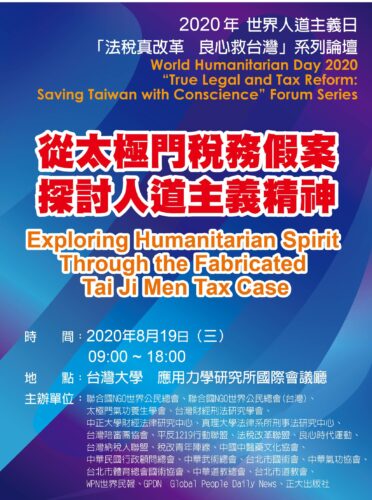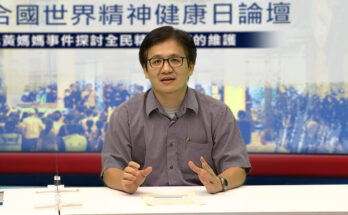As the third international review of Taiwan’s implementation of the ICCPR and ICESCR is going to take place soon, an international forum in support of World Humanitarian Day 2020 was held at the International Conference Room at Institute of Applied Mechanics of National Taiwan University on August 19, 2020. The event was co-organized by 23 organizations, including the Association of World Citizens, the Association of World Citizens in Taiwan, Tai Ji Men Qigong Academy, and Taiwan Association for Financial Criminal Law Study. Scholars and experts at home and from abroad shared their views under the theme of “Exploring Humanitarian Spirit Through the Fabricated Tai Ji Men Tax Case,” which is a case that has recently drawn much global attention. The event was covered by many media outlets in Taiwan and around the world.
Implementing conscience-driven governance to ensure respect for human rights and realize the core values of humanitarianism
“The United Nations General Assembly has designated 19 August as ‘World Humanitarian Day’ to pay tribute to aid workers in humanitarian service in difficult and often dangerous conditions,” said Rene Wadlow, president of the Association of World Citizens, one of the event co-organizers, adding that “To prevent and alleviate human suffering, to protect life and health and to ensure respect for the human person–these are the core values of humanitarian international law.”
Dr. Hong, Tao-Tze, Zhang-men-ren (grandmaster) of Tai Ji Men, stated that “Natural disasters and man-made calamities wreak havoc on people’s lives, especially the COVID-19 outbreak this year and the recent blast in Beirut. The dauntless courage and unselfish kindness of the frontline medical workers and rescuers risking their lives to save people is highly admirable.”
He also pointed out that “World Humanitarian Day is the day to observe the spirit of perseverance and dedication and the principles of kindness, fairness, neutrality and independence. It reveals the value of humanity and focuses on the caring and mutual support among the human race. And all humanitarian acts are from the innate conscience and love in our hearts.” He continued by saying, “Wars and natural disasters have caused death tolls and displaced people. However, rigid, authoritarian and bureaucratic tax regime and malfunctioning remedy system in modern democracy can trigger a silent and relentless war with more devastating impacts on fundamental human rights, value of democracy and rule of law, which are at the core of a country. Unjust legal and tax regime can lead to unrestorable disasters and even a national crisis.” He expressed his gratitude to the participants for their support of the ongoing fight for justice by saying, “You have tirelessly contributed with your expertise and practical experiences to help the people and our nation. You speak up with voices of justice to awaken public conscience. You advocate governance of state power with conscience. And you call for prevailing justice, equality and human rights. This is the humanitarian spirit at work.”
Documentary of the Tai Ji Men Case
A Factual Record of the “February 28 Incident in Taiwan’s Taxation”
The forum featured a documentary of the Tai Ji Men Case, which is called the “February 28 Incident in Taiwan’s Taxation,” where Tai Ji Men shifu (master) and dizi (similar to students) have been persecuted for 24 years. Surprisingly, the abuses are still ongoing. Since its founding 54 years ago, Tai Ji Men Qigong Academy has never had any tax issue, except for the six years (1991-1996) listed in former prosecutor Hou Kuan-Ren’s untrue indictment. He fabricated the Tai Ji Men criminal case, which was a case of injustice and a political purge. Without actual investigation, the National Taxation Bureau, based on the false claims in the indictment, treated Tai Ji Men as a cram school and issued unjustified tax bills for those six years. In 2007, the Supreme Court, the third instance court, found Tai Ji Men not guilty of any of the charges and there was no tax evasion and no violation of tax codes. So far, the taxation bureau has corrected the taxes for the red envelopes to zero for 1991, 1993, 1994, 1995, and 1996. However, the unjustified tax bills for 1992 still remain.
At the public hearing held by the Legislative Yuan in 2010, the then Deputy Finance Minister Chang Sheng-ford and General-director of the National Taxation Bureau of the Central Area Hsiao Shu-Chun promised on the spot to revoke the compulsory enforcement for 1992 and resolve the Tai Ji Men tax case within two months. The Supreme Administrative Court in it decision in 2018 stated that Tai Ji Men is a menpai (similar to school) of qigong, martial arts, and self-cultivation and that its final judgment on Zhang-men-ren’s comprehensive income taxes for 1992 failed to consider the criminal court decision and the results of the open survey. (7401 respondents to the survey all stated the red envelopes from Tai Ji Men dizi to their shifu were gifts.) The National Taxation Bureau also admitted that Tai Ji Men is not a cram school. These have proved that the final judgment for 1992 was wrong and the tax dispositions for 1992 were unlawful. The National Taxation Bureau should revoke the illegal tax bills and auctions against Tai Ji Men pursuant to Article 40 of the Tax Collection Act. However, to this day, the unlawful tax bills have not been revoked and the Administrative Enforcement Agency even auctioned and will continue to auction Tai Ji Men’s property. Tsai Fu-Chiang, a volunteer attorney for Tai Ji Men, said, “This is like a case of injustice where the government clearly knows that a person is wrongfully convicted. Instead of rectifying the injustice, the government proceeds and executes the innocent person!”
International scholars studying the Tai Ji Men case found that it resembles a case of religious persecution
“In the present day, religious harassment is more likely to take place in the form of illicit and unfair court cases. And so tax laws, zoning laws, being able to have occupancy of a building, these are the kinds of instances where religious minorities find themselves persecuted today,” said Dr. Holly Folk, associate professor at Western Washington University, adding, “And so for a case concerning the religious status of a group like Tai Ji Men as it pertains to tax law in Taiwan, I have a lot of sympathy.” “In other words, the tax evasion question, the tax status question, these are the kinds of things that are used to put the entire legitimacy of the religion into full view. And to undermine the status of a community, to say it’s not a real organization, to present groups as criminal,” she further explained. “I see the case with Tai Ji Men in a way that’s very, very isomorphic to other religious communities that face harassment.”
Dr. Pier Marco Ferraresi, a professor in the Department of Economics at the University of Turin, stated that Taiwan’s tax system is “not a transparent one, apparently, which is bad news for the economy as a whole.” “The revenue service revealed itself on that occasion as an instrument of the executive power to carry out the persecution against a legitimate spiritual movement. That also happened with other more invasive means such as preventive arrest or preventive freezing of the movement and its leaders’ assets,” said Dr. Ferraresi. “But if you (Tai Ji Men) accept to pay an unjust bill, that may be easily viewed as a consequence of some kind of fault. And you shouldn’t admit fault on your side. I strongly encourage you to fight against these persecutions,” he added.
European experts think there is a lack of a fair appeal system in
Taiwan’s democracy
“The power of the state, the ability to protect and defend individuals and groups, especially most feeble among them. And in this case, it turns out that the state did just the contrary. In the Tai Ji Men case, the power has been used, the power of the state has been used to discriminate against individuals and a group,” said Marco Respinti, Italian professional journalist, editor-in-chief of International Family News, adding that “Inconsistent application of law is a violation of the process of law. Discriminatory treatment against Tai Ji Men is a violation of the process of law. As anyone can see, Tai Ji Men suffered injustice. What does this mean? It means that taxpayers’ rights are not well protected within the system, and that the system itself, systematically, turns against taxpayers.”
Thierry Valle, director of the France NGO – Coordination des Associations & Particuliers pour la Liberté de Conscience (Coordination of Associations & Individuals for the Freedom of Conscience), stated that “L’affaire Tai Ji Men a révélé les failles fondamentales de l’état de droit et la façon dont le pouvoir de l’État a été détourné ou même abusé. L’esprit de la loi est de restaurer la justice et de régler les différends dans la société. Cependant, dans le cas du Tai Ji Men, le pouvoir de l’État a été utilisé pour discriminer les Tai Ji Men. La justice a été rendue à Tai Ji Men devant le tribunal pénal. Mais le bureau des impôts continue de hanter les hommes de Tai Ji avec des demandes fiscales invalides.” (The Tai Ji Men case exposed fundamental flaws in the rule of law and how state power has been hijacked or even abused. The spirit of the law is to restore justice and settle disputes in society. However, in the case of Tai Ji Men, state power was used to discriminate against Tai Ji Men. Justice was served on Tai Ji Men in the criminal court. But the tax office continues to haunt Tai Ji Men with invalid tax claims.)
He also pointed out, “Tai Je Men souffre violations des droits de l’homme depuis plus de 24 ans. Bien que Taiwan soit considéré comme un pays démocratique, un système d’appel équitable n’est pas encore en place pour protéger les droits de l’homme des civils.” (Tai Ji Men has suffered human rights violations for over 24 years. Although Taiwan is considered a democratic country, a fair appeals system is not yet in place to protect the human rights of civilians.)
He urged Taiwan to take immediate action to resolve the case by saying, “Taiwan, et vous personnellement, avez gagné la sympathie de nombreux pays et organisations dans le monde pour votre défense des droits démocratiques en Asie de l’Est et la gestion transparente et efficace de la crise du COVID-19. Il est grand temps que cette vieille situation soit résolue, en garantissant aux membres de Tai Ji Men leurs droits humains et leur liberté de religion.” (Taiwan, you have won the sympathy of many countries and organizations around the world for your defense of democratic rights in East Asia and the transparent and effective management of the COVID-19 crisis. It is high time that this old situation was resolved, by guaranteeing the members of Tai Ji Men their human rights and freedom of religion.)
Experts and scholars examine the health of Taiwan’s legal and tax systems before the third review of its implementation of the ICCPR and ICESCR
There were five sessions in the forum, moderated by Cheng Chung-mo, a former justice and the vice-president of the Judicial Yuan; Ching-Chin Wu, associate professor of law at Aletheia University and co-founder of Tax and Legal Reform League; Wen Yao-Yuan, a former judge, division head, and trial spokesperson of Taiwan High Court; Attorney Chang Chen-Hsing at Chiu-Shi-Li-Ding Law Firm; and Professor Lian Fu-Long at Osnabrück University, Germany, respectively. These domestic and international academics and experts examined the health of Taiwan’s legal and tax systems and pinpointed the areas needing improvement before the third review of Taiwan’s implementation of the ICCPR and ICESCR.




